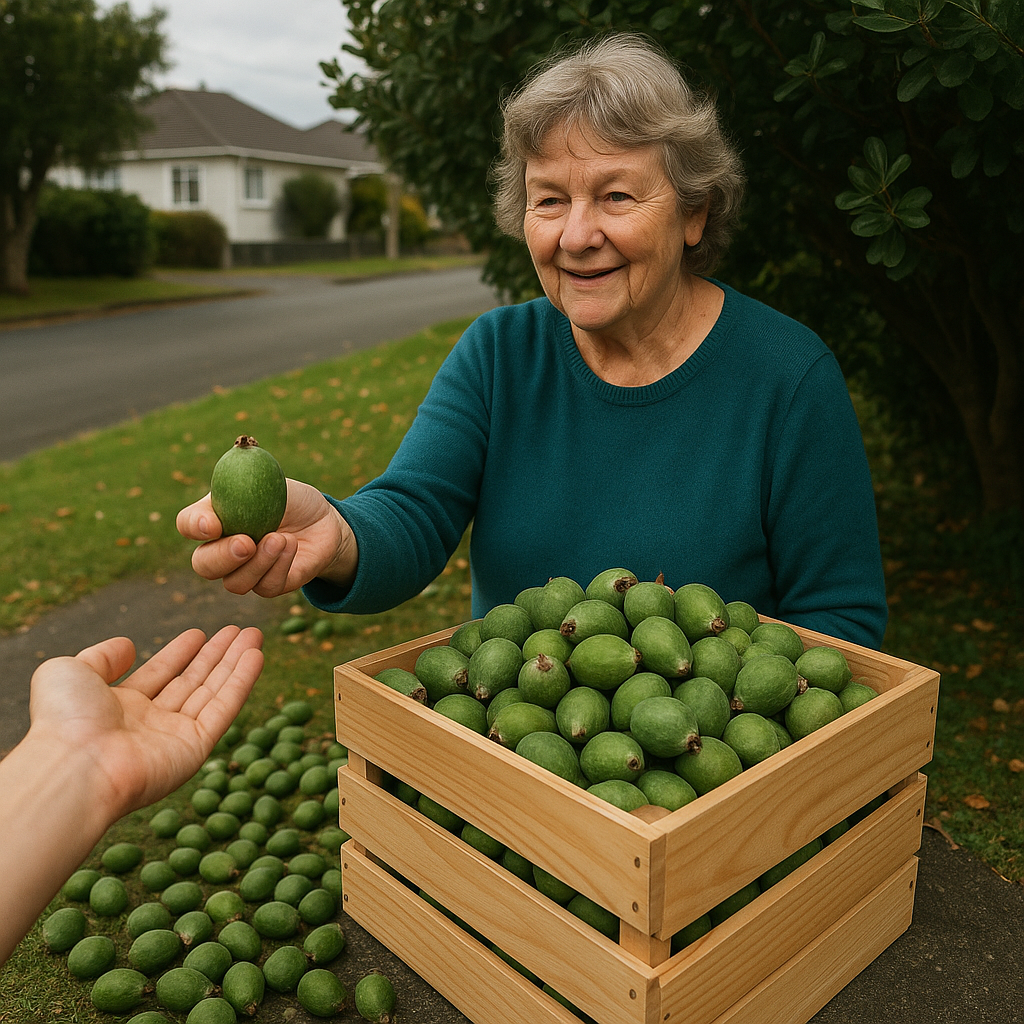In New Zealand, people love a fruit called feijoa. It comes from South America, but New Zealanders think of it as their special fruit. Unlike the kiwi fruit, feijoas are not sold much in other countries because they don’t last long. Every year, when feijoas are ready to eat, people in New Zealand get very excited. They feel a strong connection to this fruit.
Feijoas are shared a lot in New Zealand. When they fall from trees, people pick them up and give them to friends, neighbors, and even strangers. Many people never have to buy feijoas because they get them for free. This sharing makes people feel close and happy. Some people, like a lady named Diana, give away lots of feijoas from their gardens to others, showing kindness and community spirit.
Original news source: New Zealand’s unofficial fruit is the feijoa, not the kiwi. And part of the fun is in giving it away (AP News)
🎧 Listen:
Slow
Normal
Fast
📖 Vocabulary:
| 1 | fruit | Something you eat, like an apple or banana |
| 2 | special | Something that is not like anything else |
| 3 | excited | Feeling very happy and full of energy |
| 4 | connection | A feeling that you are close to someone or something |
| 5 | shared | Giving something to others |
| 6 | neighbors | People who live near you |
| 7 | strangers | People you don’t know |
| 8 | buy | To give money to get something |
| 9 | gardens | Places where people grow plants and flowers |
| 10 | kindness | Being nice and helpful to others |
Group or Classroom Activities
Warm-up Activities:
– CHARADES
Instructions: Students will take turns acting out the word “feijoa” without speaking. The rest of the class will guess what they are acting out. This helps with vocabulary recognition and encourages non-verbal communication.
– VOCABULARY PICTIONARY
Instructions: Divide the class into small groups. Each group will draw a picture of a feijoa or related concepts (like sharing or community) on the board while the other groups guess the word. This activity enhances vocabulary understanding through visual representation.
– OPINION POLL
Instructions: Ask students if they have ever tried a feijoa or if they would like to try it. They will raise their hands to indicate their opinion. Afterward, students can share why they feel that way, helping them practice speaking in English.
– MIND MAP
Instructions: On the board, write “Feijoa” in the center. Students will take turns adding words or phrases related to feijoas (like “New Zealand,” “fruit,” “sharing”) around it. This helps with vocabulary building and organization of ideas.
– PASS THE STORY
Instructions: Start a story about a feijoa tree in New Zealand. Each student adds one sentence to the story as it goes around the room. This encourages creativity and practice in sentence structure while reinforcing vocabulary from the article.
🤔 Comprehension Questions:
1. What fruit do people in New Zealand love?
2. Where does the feijoa fruit come from?
3. Why are feijoas not sold much in other countries?
4. How do people in New Zealand feel when feijoas are ready to eat?
5. What do people do when feijoas fall from trees?
6. Who is a lady that gives away feijoas from her garden?
7. How does sharing feijoas make people feel?
Go to answers ⇩
🎧✍️ Listen and Fill in the Gaps:
In New (1)______, people love a fruit called (2)______. It comes from South America, but New Zealanders think of it as their special fruit. Unlike the kiwi fruit, feijoas are not sold much in other countries because they don’t last long. Every year, when feijoas are (3)______ to eat, people in New Zealand get very (4)______. They feel a strong connection to this fruit.
Feijoas are shared a lot in New Zealand. When they fall from trees, people pick them up and give them to (5)______, neighbors, and even strangers. Many people never (6)______ to buy feijoas because they get them for free. This sharing makes people feel close and (7)______. Some people, like a lady named Diana, give away lots of feijoas from their gardens to others, showing (8)______ and community spirit.
Go to answers ⇩
💬 Discussion Questions:
Students can ask a partner these questions, or discuss them as a group.
1. What is your favorite fruit?
2. Do you like to share your food with friends? Why?
3. How would you feel if someone gave you a special fruit?
4. Do you think it is nice to share things with others? Why or why not?
5. What is a fruit you think is very special?
6. How do you feel when you eat your favorite fruit?
7. Do you like to try new fruits? Why?
8. What would you do if you found a fruit on the ground?
9. Do you think it is fun to pick fruit from trees? Why?
10. How would you feel if you had a big garden with lots of fruits?
11. Do you think sharing makes people happy? Why or why not?
12. What is a nice thing you can do for your friends?
Individual Activities
📖💭 Vocabulary Meanings:
Match each word to its meaning.
Words:
1. fruit
2. special
3. excited
4. connection
5. shared
6. neighbors
7. strangers
8. buy
9. gardens
10. kindness
Meanings:
(A) Giving something to others
(B) Feeling very happy and full of energy
(C) Something you eat, like an apple or banana
(D) A feeling that you are close to someone or something
(E) To give money to get something
(F) People who live near you
(G) Being nice and helpful to others
(H) Something that is not like anything else
(I) Places where people grow plants and flowers
(J) People you don’t know
Go to answers ⇩
🔡 Multiple Choice Questions:
1. What fruit do people in New Zealand love?
(a) Feijoa
(b) Apple
(c) Banana
(d) Orange
2. Where does the feijoa come from?
(a) Australia
(b) Africa
(c) Asia
(d) South America
3. How do New Zealanders feel about feijoas?
(a) Sad
(b) Excited
(c) Angry
(d) Tired
4. What do people do with feijoas when they fall from trees?
(a) Throw them away
(b) Pick them up
(c) Eat them all
(d) Plant them
5. Who do people share feijoas with?
(a) Only family
(b) Only kids
(c) Friends
(d) Only pets
6. Why do many people not buy feijoas?
(a) They are too expensive
(b) They do not like them
(c) They are not good
(d) They get them for free
7. What does sharing feijoas make people feel?
(a) Tired
(b) Lonely
(c) Happy
(d) Bored
8. Who is a lady that gives away feijoas?
(a) Diana
(b) Sarah
(c) Emily
(d) Jessica
Go to answers ⇩
🕵️ True or False Questions:
1. People in New Zealand get very happy when feijoas are ready to eat.
2. Some people ignore fallen feijoas from trees.
3. Feijoas come from South America.
4. Feijoas do not last long when picked.
5. A lady named Diana gives away feijoas from her garden.
6. Sharing feijoas makes people feel distant and unhappy.
7. Feijoas are a common fruit in New Zealand.
8. Few people in New Zealand share feijoas with others.
Go to answers ⇩
📝 Write a Summary:
Write a summary of this news article in two sentences.
Check your writing now with the best free AI for English writing!
Writing Questions:
Answer the following questions. Write as much as you can for each answer.
Check your answers with our free English writing assistant!
1. What fruit do people in New Zealand love?
2. Where does the feijoa fruit come from?
3. Why do people in New Zealand get excited about feijoas?
4. What do people do when feijoas fall from trees?
5. Who is Diana and what does she do with feijoas?
✅ Answers
🤔✅ Comprehension Question Answers:
1. What fruit do people in New Zealand love?
People in New Zealand love feijoas.
2. Where does the feijoa fruit come from?
The feijoa fruit comes from South America.
3. Why are feijoas not sold much in other countries?
Feijoas are not sold much in other countries because they don’t last long.
4. How do people in New Zealand feel when feijoas are ready to eat?
People in New Zealand feel very excited when feijoas are ready to eat.
5. What do people do when feijoas fall from trees?
When feijoas fall from trees, people pick them up and share them.
6. Who is a lady that gives away feijoas from her garden?
A lady named Diana gives away feijoas from her garden.
7. How does sharing feijoas make people feel?
Sharing feijoas makes people feel close and happy.
Go back to questions ⇧
🎧✍️✅ Listen and Fill in the Gaps Answers:
(1) Zealand
(2) feijoa
(3) ready
(4) excited
(5) friends
(6) have
(7) happy
(8) kindness
Go back to questions ⇧
📖💭✅ Vocabulary Meanings Answers:
1. fruit
Answer: (C) Something you eat, like an apple or banana
2. special
Answer: (H) Something that is not like anything else
3. excited
Answer: (B) Feeling very happy and full of energy
4. connection
Answer: (D) A feeling that you are close to someone or something
5. shared
Answer: (A) Giving something to others
6. neighbors
Answer: (F) People who live near you
7. strangers
Answer: (J) People you don’t know
8. buy
Answer: (E) To give money to get something
9. gardens
Answer: (I) Places where people grow plants and flowers
10. kindness
Answer: (G) Being nice and helpful to others
Go back to questions ⇧
🔡✅ Multiple Choice Answers:
1. What fruit do people in New Zealand love?
Answer: (a) Feijoa
2. Where does the feijoa come from?
Answer: (d) South America
3. How do New Zealanders feel about feijoas?
Answer: (b) Excited
4. What do people do with feijoas when they fall from trees?
Answer: (b) Pick them up
5. Who do people share feijoas with?
Answer: (c) Friends
6. Why do many people not buy feijoas?
Answer: (d) They get them for free
7. What does sharing feijoas make people feel?
Answer: (c) Happy
8. Who is a lady that gives away feijoas?
Answer: (a) Diana
Go back to questions ⇧
🕵️✅ True or False Answers:
1. People in New Zealand get very happy when feijoas are ready to eat. (Answer: True)
2. Some people ignore fallen feijoas from trees. (Answer: False)
3. Feijoas come from South America. (Answer: True)
4. Feijoas do not last long when picked. (Answer: True)
5. A lady named Diana gives away feijoas from her garden. (Answer: True)
6. Sharing feijoas makes people feel distant and unhappy. (Answer: False)
7. Feijoas are a common fruit in New Zealand. (Answer: False)
8. Few people in New Zealand share feijoas with others. (Answer: False)
Go back to questions ⇧















